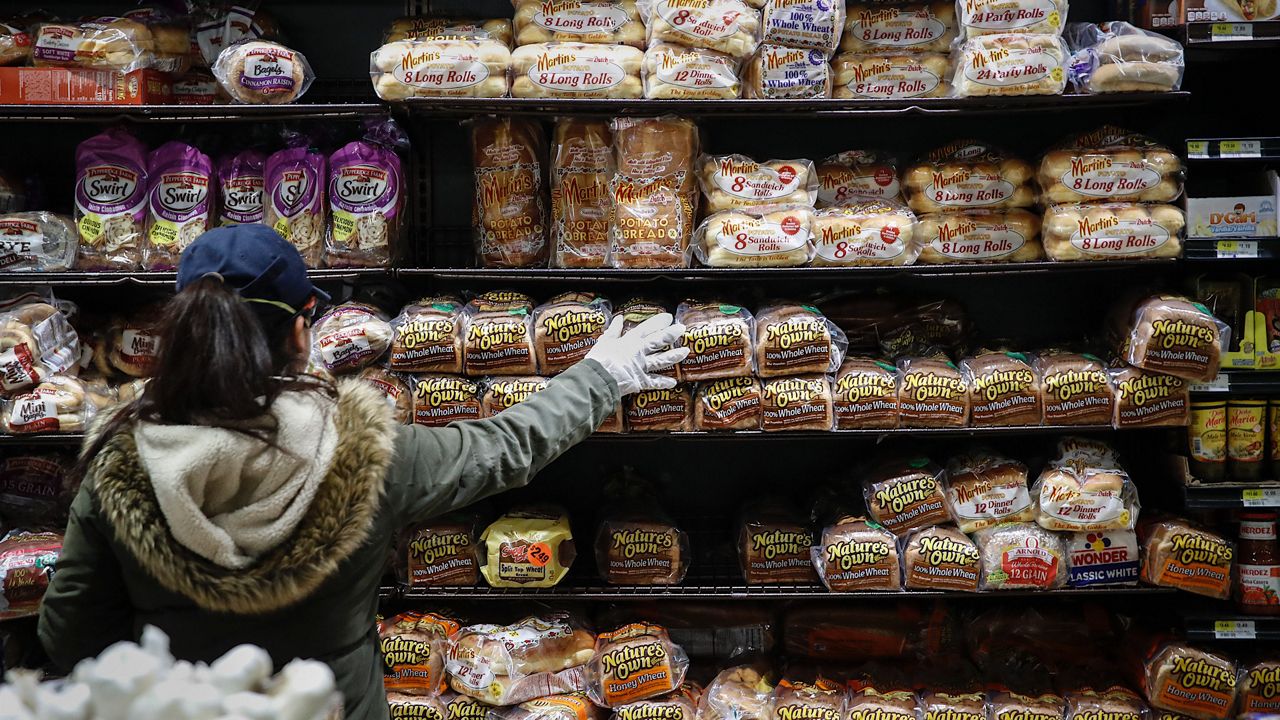LOUISVILLE, Ky. — For seven years, Mason Sims’ job at Kroger was relatively free of hazards. That changed in his eighth year.
This spring, COVID-19 turned Sims into a frontline essential worker. As much of the country shut down, and many people began working from home, or not at all, Sims reported to his store in Lexington to work the checkout lane or staff the customer service desk. He calls himself a “jack of all trades.” And for a couple of months, he was rewarded for it, earning a $2-per-hour pay bump that Kroger paid to its employees and called a “Hero Bonus.”
“We thought it was really nice,” Sims said of himself and his co-workers. “It was something that gave us a little boost. It helped us get all of our bills paid and make sure that we were on top of finances.”
In late spring, Kroger, like many other retail giants that provided workers with a pay increase in the early days of the pandemic, ended its hazard pay.
“I guess we’re no longer considered heroes,” Sims said.
Now, the pandemic is more dangerous than ever. In December, Kentucky saw a record 754 people die of COVID-19. That’s more than the first five months of the pandemic combined. But even with the crisis worsening, hazard pay shows no sign of returning, said Caitlin Blair, political and communications director of United Food and Commercial Workers Local 227, which represents 25,000 grocery and meatpacking workers in Kentucky and Southern Indiana.
“They deserve hazard pay because the hazard still exists,” Blair said. “And we should be very clear: they are getting sick and they are dying.”
Nationally, more than 100 UFCW grocery workers have died of COVID-19, according to the union, with another 17,400 workers infected or exposed to the virus.
Chris Buckley is one of them. A meat manager at a Kroger in Carrollton, Ky., Buckley missed a week of work this fall after a positive COVID-19 test. It was long after Kroger’s hazard pay expired and months since bonus payments, dubbed “Thank You Pay,” were handed out in June. “It would have been great to have the extra money to fall back on,” Buckley said.
But hazard pay isn’t just about making up for the wages sick workers lose, Buckley said. It’s also about acknowledging the unique dangers of working in one of the few places where people are still allowed to congregate during the pandemic.
Buckley said customers routinely violate safety protocols by coming to the store in large family groups or refusing to wear masks. “The risk to the public is substantial for customers, but we’re there all day every day, so it’s a lot higher for us,” he said.
“A lot of people might just see it as someone checking out their groceries, but they don’t understand the sacrifices that people are making just by going to work everyday,” Sims said. “A lot of employees don’t want to put their lives or the health of their family members at risk, but the bills have to get paid, children have to be taken care of.”
The federal government has gestured toward stepping in and filling the void left by companies that ended their hazard pay programs. In May, the House passed The Heroes Act, which included a $200 billion fund to provide hazard pay to frontline essential workers. The Senate never took up the bill. Hazard pay provisions also failed to make it into the relief package that President Trump signed last week.
Some states used CARES Act funding to establish their own hazard pay programs, but Kentucky is not among them.
Both Sims and Buckley said Kroger’s financial success during the pandemic makes the lack of hazard pay even harder to stomach. The company, like many other retailers, has netted massive earnings in 2020. In early December, Kroger reported third-quarter earnings that were up 11.3 percent over last year. Net income soared to $631 million compared to $263 million in the third quarter of 2019.
The company also attracted negative attention in May when, just as its hazard pay program ended, word came that CEO Rodney McMullen was paid more than $14.2 million in the fiscal year 2019. Vermont Sen. Bernie Sanders called his pay raise “disgusting.”
“Companies have chosen to take their record profits and line the pockets of their shareholders,” Blair said.
Kroger spokesperson Erin Grant did not respond directly to accusations that the company is prioritizing shareholders, but she did defend Kroger's investment in workers. In an e-mailed statement, she wrote that Kroger has invested more than $1.3 billion in bonus pay and measures to protect the safety of workers and customers. “Our most urgent priority throughout this pandemic has been to provide a safe environment for our associates and customers while meeting our societal obligation to provide open stores, e-commerce solutions and an efficiently operating supply chain so that our communities have access to fresh, affordable food and essentials,” Grant wrote.
But six months after most hazard pay has ended, Blair said, the early efforts to compensate workers for the danger of their jobs seem like a “PR stunt.”
“We’ve seen so many billboards, and newspaper ads, and commercials, talking about how much companies value the contributions that frontline workers have made,” she said. “Yet they refuse to give them hazard pay. The way that you recognize and value work is by putting the money behind it.”
“We should be getting it and it should have been an ongoing thing,” Buckley added. “It never should have stopped because we’ve been going non-stop.”



